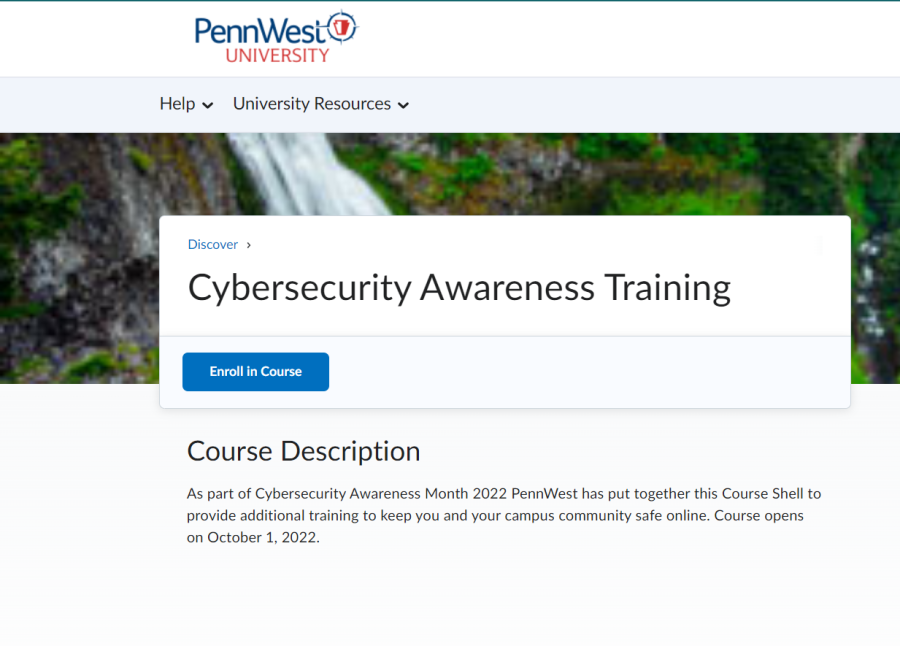Enhancing Student Knowledge on Cybersecurity
Cybersecurity Awareness Month comes to PennWest
October 14, 2022
PennWest University announces the fight against cybersecurity threats is an ongoing community effort with the arrival of Cybersecurity Awareness Month.
The Cybersecurity Awareness campaign educates individuals on how to protect themselves from online threats, according to the Cybersecurity and Infrastructure Security Agency website. This national initiative, enacted by President George W. Bush and the U.S. Congress in 2004, takes place annually in the month of October.
In recent years, the CISA states that “threats to technology and confidential data [have] become more commonplace.”
The email, sent by university technology services Monday morning, announced a similar effort at PennWest University. Technology services contact, Dennis Carson, said that both students and faculty should pay attention to the resources being sent out. These resources include a virtual training program, social media tips and tricks, and newsletters sent through technology services.
“As the world moved more to computers and technology, attacks started to rise,” Carson said. “It’s important for everyone to understand the risks to be able to protect business and personal information and data.”
Carson said that for college students in particular, phishing poses a major risk. Phishing emails are used to trick people into providing information voluntarily, under the guise of an official correspondence.
A common strategy targeting college students involves fake job listings. Sometimes the student will receive a check from the scammer, then be asked to buy a gift card to cover supplies for the position. After the initial check bounces, the student loses the money put on the gift card and often their personal data. Carson said that once the information is gone, it is virtually irretrievable.
“Phishing takes advantage of human nature, of wanting to be helpful,” Carson said. “People get an email, and they want to reply and help out. So, they might provide their username or password without thinking twice. Or they may buy a gift card and send the code to the attackers. That’s why cybersecurity awareness training is so important.”
A cybersecurity attack, defined by Carson, is any unwelcome attempt to steal, alter, expose, disable, or destroy information in a digital form. However, awareness of this threat varies widely within the student body.
Kristen Baney, a Sophomore criminal justice major at PennWest California said she knew the school has sent out some emails about it.
“I get notices at least twice a month about scams and other cybersecurity threats from the university,” Baney said.
Morgan Ferris, also a Sophomore at California campus, said she was not actively aware of cybersecurity threats until she received the technology services email. Ferris said that it is rare for her to receive notices about current scams or cyberattacks.
“They always feel the need to send an email after the situation has happened, and in my opinion, that is not solving anything,” Ferris said. “There is no doubt in my mind that the university can do a better job. Thankfully, no one I know or myself has been involved in any kind of cybersecurity scam. I hope it stays that way!”
Ferris said that she personally does not do anything to protect herself from cybersecurity threats, something that she hopes to change.
“As terrible as it sounds, I do not do anything special to protect myself from threats or scams,” Ferris said. “The only thing I would say I do is that I read all emails thoroughly to make sure they are legitimate.”
Despite Ferris’ uncertainty with this method, it aligns with suggestions from the CISA. Their website lists four significant ways to protect yourself: think before you click, update your software, use strong passwords, and enable multifactor authentication.
Carson said, these methods are mirrored by advice from technology services, with the assertion that PennWest will never ask for passwords or sensitive information over email. He referenced the tendency of scams to change topics to meet current events, such as the COVID-19 pandemic, and urges people to take advantage of the resources available through the university to stay vigilant.
“As scams get more complex, this is really a life skill,” Carson said.








